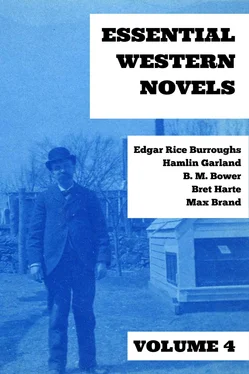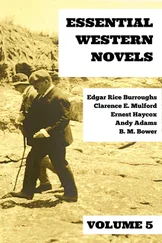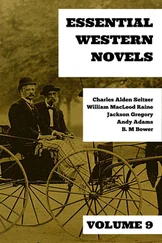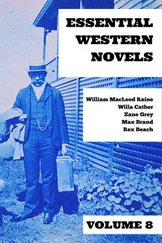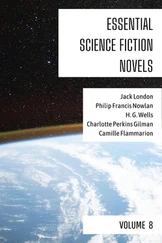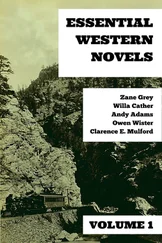1 ...6 7 8 10 11 12 ...47 "Squaw-man" is the name given to a white man who has married one or more Indian wives, and been regularly adopted by their tribe with whom he lives. With the exception of being of occasional use as an interpreter, he is an utterly worthless person. He has completely left his own race and taken to the ways of the savage, and is equally despised by the whites and by his adopted brethren. Many of the woodcutters who supply fuel to steamboats on the upper Missouri marry, or rather buy, Indian wives; but they do not form part of the tribal family, as does the "squaw-man." Often it is policy for them to take wives from tribes which are dangerous to their safety. A wife insures protection from the depredations of her tribe; and when her lord and master is tired of her, or wishes to form other business relations, he simply tells her and her progeny to go home. These men have the reputation of being most active agents in supplying ammunition to the Indians.
At the border of the British possessions, sometimes on our side and sometimes to the north, are several thousands of half-breeds who seem descended from French and Scotch fathers. They speak Cree and some of the other Indian tongues, but customarily use a French patois which is easily understood. Their government seems to be founded on the old patriarchal system. They are strict Catholics, and are duly married by a priest, who makes occasional visits to them, and insists upon legally uniting in wedlock such couples as he thinks have proved this ceremony to be necessary. They lead a nomadic life, trading between the whites and the Indians, supplying the latter with ammunition, subsisting mostly on game and buffalo. The latter they make up into pemmican,—a large bundle of finely chopped fat and lean, seasoned with wild herbs, and tightly wrapped up in buffalo-hide. This they sell, or keep for winter use. They travel in curious one-horse carts, in the manufacture of which little or no iron is used, the pinning being done with wood, and the wheels bound together with thongs of green buffalo-hide, which shrink as they dry. As these carts will float in water, an unfordable stream can be crossed by swimming the horses attached to the shafts. These people always camp with their carts in a circle, the shafts towards the centre, and the carts prove an effective barricade against any enemy without cannon. Their stock is corralled every night inside the circle. These half-breeds must be classed more as Indians than as whites, as their actions, habits, and beliefs are inherited more from their mothers than from their fathers.
A great and always remunerative pursuit on the frontier is that of cattle-raising. A well-selected range, near streams which do not dry up in summer, and with timber, or such undulations of the ground as would afford shelter for the beasts from the worst winter's winds, together with a small capital and reasonable care and exertion, will in a few years produce a fortune,—and not only a fortune, but robust health for the herder. The season when he is away from his cabin, herding up his cattle, is mild enough to allow sleeping on the ground. He is not compelled, like the soldier, at times to endure the blizzard or to sleep in the snow. Many young men engaged in cattle-raising are of excellent education and social position, and very much attached to the life they lead; and well they may be, as it gives them all the pleasure the frontier can afford with no more hardship than is good for them. Choosing congenial companions, they build a comfortable ranch, stock it well with books, and employ men to assist in the rougher duties, either by hiring them with fixed wages or giving them an interest in the herd. The day is passed in the saddle, the evening before a crackling wood-fire. The only time when great exertion is necessary is during the "roundings up"; then their whole property in cattle must be brought together, the young calves branded, and the brands of their parents retouched if effaced. There is no animal near by powerful enough to destroy cattle, and there is nothing to prevent their yearly increase. The Indians may kill one now and then for food, but cannot drive them off, as their movement is too slow. Cattle-stealing is not so easy as horse-stealing.
All these frontier folk eat, drink, and live, and after their manner enjoy life. We can perceive that they have occasional hardships, but they have pleasures which may not be so easily understood by people who live in comfortable houses, and drive in well-hung and well-cushioned carriages, or walk paved streets. A life in the open air, freedom from restraint, and a vigorous appetite, generally finding a hearty meal to satisfy it, make difficult a return to the humdrum of steady work and comparative respectability. They have their place in the drama of our national life, for better or for worse, and their pursuits and character must be recognized and studied by any one who would comprehend our great Western country.

The Deputy Sheriff of Comanche County

By Edgar Rice Burroughs
––––––––

THE LINE FENCE
A LONE rider drew rein before a gate consisting of three poles cut from straight pine saplings. He leaned from the saddle and dropped one end of each of the two upper bars to the ground, stepped his horse over the remaining bar and, stooping again, replaced the others. Then he rode slowly along a dirt road that showed little signs of travel.
As he rode he seemed but an animated part of the surrounding landscape, so perfectly did he harmonize from the crown of his Stetson to the light shod hoofs of his pony.
Everything that he wore seemed a part of him, as he seemed a part of his horse. His well worn chaps, his cartridge belt and holster, his shirt and bandana, like the leather of his horse trappings, were toned and mellowed by age and usage; yet they carried the same suggestion of strength and freshness and efficiency as did his bronzed face and his clear, gray eyes.
His mount moved at an easy, shuffling gait that some horsemen might call a rack, but which the young man would have described as a pace.
The horse was that homeliest of all horse colors, a blue roan, the only point of distinction in his appearance being a circular white spot, about the size of a saucer, that encircled his right eye, a marking which could not be said to greatly enhance his beauty, though it had served another and excellent purpose in suggesting his name—Bull's Eye.
At first glance the young man might have been found as little remarkable as his horse. In New Mexico there are probably thousands of other young men who look very much like him. His one personal adornment, in which he took a quiet, secret pride, was a flowing, brown mustache with drooping ends, which accomplished little more than to collect alkali dust and hide an otherwise strong and handsome mouth, while the low drawn brim of his Stetson almost accomplished the same result for the man's finest features—a pair of unusually arresting gray eyes.
The road wound through low rolling hills covered with stunted cedars, beyond which rose a range of mountains, whose sides were clothed with pine, the dark green of which was broken occasionally by irregular patches of quaking aspens, the whole mellowed and softened and mysterized by an enveloping purple haze.
Читать дальше
